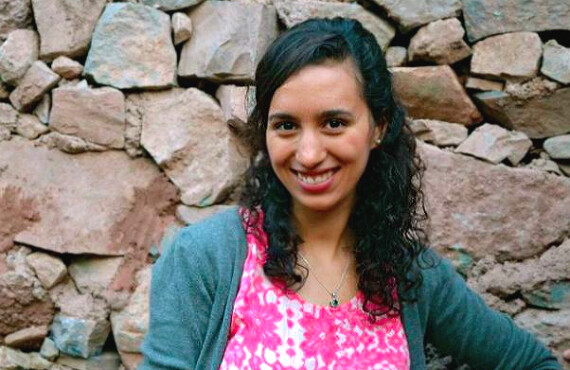Penn Graduate Student Named #17 of the Top 100 Most Powerful Arab Women
Students from the University of Pennsylvania really do change the world.
Maha Laziri, 24, a student in Penn’s Graduate School of Education, is already making a difference in remote villages of Morocco.
Her work in international development landed her at No. 17 on this year’s list from Arabian Business of the 100 Most Powerful Arab Women. She’s one of the youngest women featured on the list.
Originally from Meknes, Morocco, she is the only daughter of two teachers. Her mother works in a Moroccan public elementary school, her father in a French high school.
In 2002, when she was 12, Laziri’s family ventured into the High Atlas Mountains for a summer holiday and hiking. During the family vacation, she experienced an awakening of sorts. She saw how certain parts of Morocco were lacking access to the basics, like roads, electricity, a health system and educational resources.
At first, the villagers participated in a few informal educational activities with her parents. Even though they were small in scale, the friendships Laziri’s family developed with the villagers encouraged the family to go back there every summer. Soon, Laziri felt inspired to do more.
“It made me think that we need to formalize our actions through the creation of a non-governmental organization,” Laziri explains. “My parents and friends liked the idea.”
Right there in 2011, the idea for Alt‘lym Lilmaghrib, which closely translates into Teach4Morocco, was born.
Says Laziri, “Many people believe that Teach4Morocco is affiliated with Teach For All, but it is not. Teach4Morocco is an independent entity that humbly began with renovating a school in a very remote village.”
In the summer of 2012, people from another village approached the Laziri family and suggested working with their local NGO to build a school for children.
“We had a lot of support from the Ministry of National Education who followed the construction process and equipped the school. We have also partnered with a local organization in the village and a like-minded student-run French NGO,” Laziri says.
She adds the true learning experience that Teach4Moroco acquired as an organization was more than just participating in the construction and renovation projects.
“Our immersion in the environment and the friendships we build allow us to draw a more accurate picture of the nature and the complexity of the educational challenges in the remote areas of Morocco,” she says.
Twelve years later, things are starting to get better. Laziri still visits every summer.
“The time we spend in the Atlas is a time of action but also a time of reflection on how to better our programs and develop more long-term strategies aiming at enhancing the quality of education in the region,” she adds.
About three years ago, Laziri met Daniel Wagner, a professor in Penn GSE, at the World Innovation Summit for Education in Doha, Qatar.
It was a serendipitous meeting. She came away knowing that Penn GSE’s International Educational Development program, directed by Wagner, was a perfect bridge between her background in international development and her interest in education.
She says that her experience with Teach4Morocco offered her a solid empirical grounding for her learning experience at Penn GSE because she is able to relate everything she learns in the classroom to the issues she faced in the field.
Laziri refers often to something that Ameena Ghaffar Kucher, a senior lecturer at Penn GSE, shared with her, “Good intentions are important but not enough.”
“Here at Penn GSE I am trying to shift from solely having good intention and a desire to serve Morocco to a more structured thoughtful impact,” says Laziri. “It is also an occasion to demystify the concept that it takes only a good heart alone to do development work.”
On campus, Laziri lives in Gregory College House, where she serves as a graduate assistant and the director of the French House program. Designed for students interested in learning the French language and discovering the Francophone culture, La Maison Francaise is a conversational French program that builds on existing skills and strengthens students’ French-speaking abilities through activities and projects.
She is also a member of the Al Bustan Choir Ensemble. “I really find it interesting as it allows me to share my love for Arab music and culture with other people who are discovering it,” she says.
As for her making the Top 100 list of Most Powerful Arab Women, while it was a great surprise, she is primarily focused on making a difference in the lives of others.
“I believe there are many other women doing great things in the Middle East and North Africa region. When I think about it, I find that Teach4Morocco did the most with the limited opportunities we have,” Laziri says. “This makes me very proud of our team.”
Laziri, who graduates this year, is hoping to find a job in education research and policy in Morocco or Southeast Asia.








